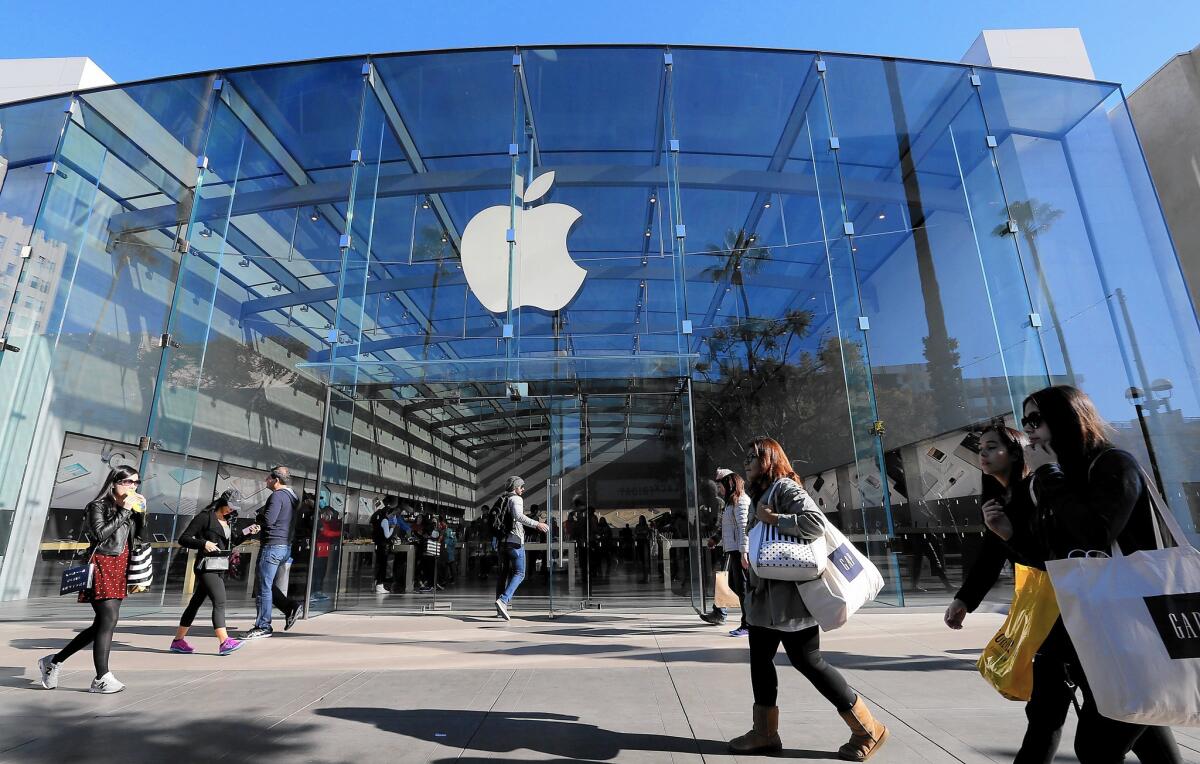Why Cyber Monday still has retail punch

Shoppers stroll along the Third Street Promenade in Santa Monica on Black Friday, traditionally considered the start of the holiday shopping season.
Consumers are expected to click “proceed to checkout” with their online shopping carts in record numbers this Cyber Monday in what is still the biggest online shopping day of the year.
Online sales for this Cyber Monday are expected to total $3 billion for the first time, a 12% increase from a year ago, the digital marketing and media firm Adobe Systems Inc. predicts.
That’s also a 50% surge from Cyber Monday’s sales of $2 billion only three years ago, said Tamara Gaffney, principal research analyst at Adobe’s Digital Index division.
Holiday gift guides for everyone (and pet!) on your list
And roughly 75% of this year’s dollars will be spent on just 1% of the product categories available — namely computers, televisions, phones, video games and other electronics, along with gift cards and toys — because people tend to buy more expensive items during the holidays, she said.
Gift cards don’t have to be costly, but people will spend more on gift cards for the holidays than they would ordinarily, Gaffney said.
The folks at the National Retail Federation trade group concocted the term “Cyber Monday” in 2005 when they noticed a spike in online sales following the traditional post-Thanksgiving Black Friday start to the holiday shopping season.
At the time, many consumers had relatively slow Internet connections at home. It became apparent that when they returned to work or school Monday — with faster computer speeds at their fingertips — they shopped online. Retailers seized on the trend and began heavily promoting Cyber Monday sales.
That’s all changed, of course, with the arrival of smartphones, tablets and faster Internet speeds generally.
Now, consumers can shop online throughout the holiday season, starting weeks before Thanksgiving. Retailers are happy to oblige with a steady diet of sales.
Wal-Mart Stores Inc., for instance, is launching its online Cyber Monday sale Sunday night. Target Corp., electronics retailer Best Buy Co. and the Kohl’s department-store chain, among others, are touting a “Cyber Week” of promotions on their websites that start Monday.
Even so, “nearly 80% of consumers we’ve surveyed still plan to shop on Cyber Monday,” said Artemis Berry, vice president of digital retail at the National Retail Federation and its Shop.org affiliate.
The figure is closer to 90% among digitally savvy millennials (aged 18 to 34), she said.
Jason Goldberger, president of Target.com, wrote on a Target blog this week that although the days of shoppers waiting to use work computers on Monday are “long gone,” he believes “Cyber Monday will continue to grow at a healthy clip for years to come.”
One reason: “Consumers have come to expect great deals on Cyber Monday — and retailers will continue to deliver,” he wrote.
Retailers will not only slash prices but also offer free or expedited shipping and, in some cases, “cash awards” or other discounts for purchases made during the rest of the holiday season, Berry said. They’ll also extend Cyber Monday sales through much of next week.
But in a sign of how Cyber Monday’s once-unique status in the holiday shopping season has faded because of advancing technology, the volume of online shopping on Black Friday is creeping closer to Cyber Monday’s sales.
Online sales for this year’s Black Friday will reach $2.7 billion — a 15% increase from last year — and they’ll likely surpass Cyber Monday’s sales in 2016, Adobe Systems predicts.
Adobe also forecasts that 39% of shoppers will use their smartphones or tablets to visit retailers’ websites Monday, but they’ll account for only 29% of the retailers’ online sales.
Many consumers “use mobile devices to shop but not necessarily to buy” because the “shopping experience is still not as easy as with a desktop computer,” Gaffney said.
Either way, online shopping on Black Friday and Cyber Monday solves a major problem for many consumers: The hassle of facing the throngs cramming the bricks-and-mortar stores.
“A lot of people appreciate the opportunity to stay home and order online,” said Lars Perner, an assistant professor of marketing at USC’s Marshall School of Business.
“It’s a good excuse to sleep in on Black Friday and not have to brave the crowds,” he said. “It’s a lot easier to go from website to website.”
Yet many shoppers do both, using their mobile devices to peruse and compare a store’s items while actually standing in the store.
Many retailers, in turn, now view themselves as “brick-and-click” stores that aggressively pursue shoppers through both channels. After all, they’re also competing against such online retail giants as Amazon.com.
As Cyber Monday illustrates, “there’s not a conversation about retail today without talking about digital,” Berry said.
Twitter: @PeltzLATimes
ALSO
Lazarus: You’ve bought it. Now what about returning it?
Marketing start-up Ahalogy pins its future on Pinterest
Personal finance Q&A: Tax refunds may take longer amid IRS budget cuts







